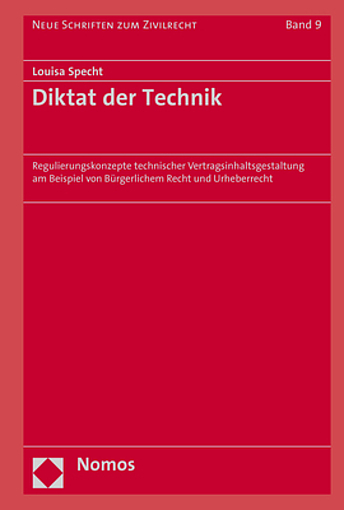englischThis study discusses the effects of technology on how the content of contracts is designed. For example, today e-books can be equipped with a technological protection mechanism which prevents them from being copied, which means that an agreement under private law which stipulates that a book cannot be copied is no longer necessary. However, if a contracting party is able to dispense with action using technological means because the design of technological devices allows it to do so, this technology then displaces legal regulations. Therefore, this study examines the boundaries which the technological design of contractual objects is subject to and what effects its application has on the institution of contractual freedom, because if a contractual regulation is replaced by technological design, it threatens to nullify regulations such as §§ 134, 138 of German Basic Law, Germany’s consumer protection law or even the limiting conditions of its copyright law. This work develops mechanisms to counteract the law being undermined by technology in this way.
Die Arbeit diskutiert die Auswirkungen von Technik auf die Inhaltsgestaltung von Verträgen. So können heute etwa E-Books mit einer technischen Schutzmaßnahme versehen werden, die eine Kopiermöglichkeit ausschließt. Eine privatrechtliche Vereinbarung, wonach das Buch nicht mehr kopiert werden darf, ist nicht mehr nötig. Wenn aber eine Vertragspartei Handlungen durch technische Mittel ausschließen kann, weil die Architektur digitaler Güter dies zulässt, tritt diese Architektur an die Stelle der gesetzlichen Regelung. Die Arbeit untersucht daher, welchen Grenzen diese technischen Gestaltungsmöglichkeiten unterliegen und welche Auswirkungen ihre Verwendung auf das Institut der Vertragsfreiheit hat. Denn wenn eine vertragliche Regelung durch technisch-faktische Gestaltung ersetzt wird, drohen Regelungen wie §§ 134, 138 BGB, das AGB-Recht oder auch urheberrechtliche Schrankenbestimmungen leer zu laufen. Die Arbeit entwickelt Mechanismen, um einem solchen Unterlaufen von Recht durch Technik entgegenzuwirken.


